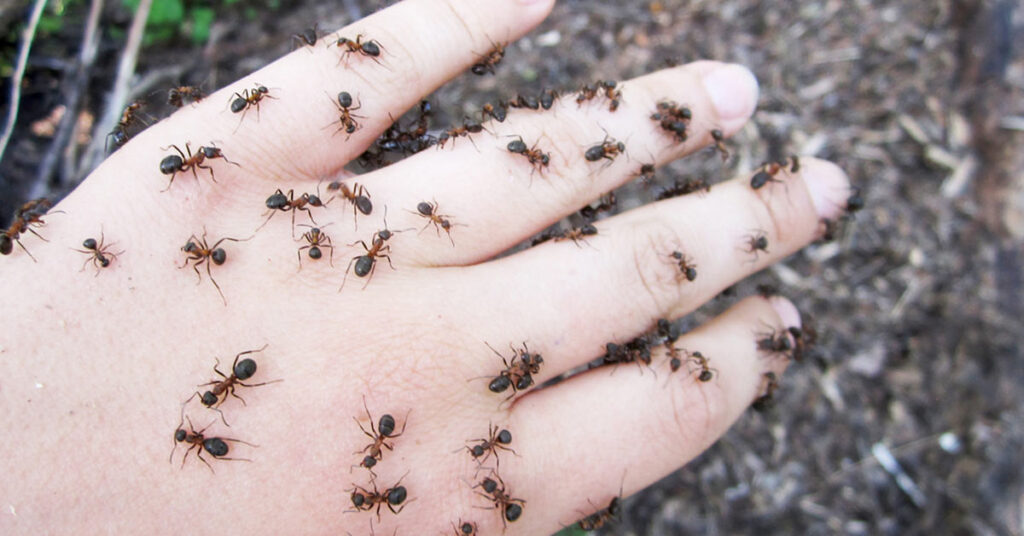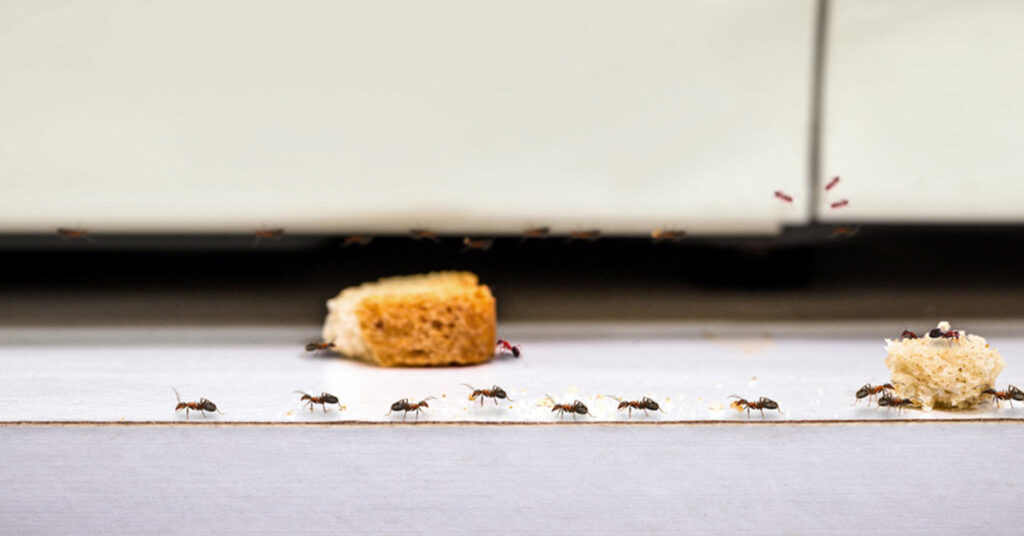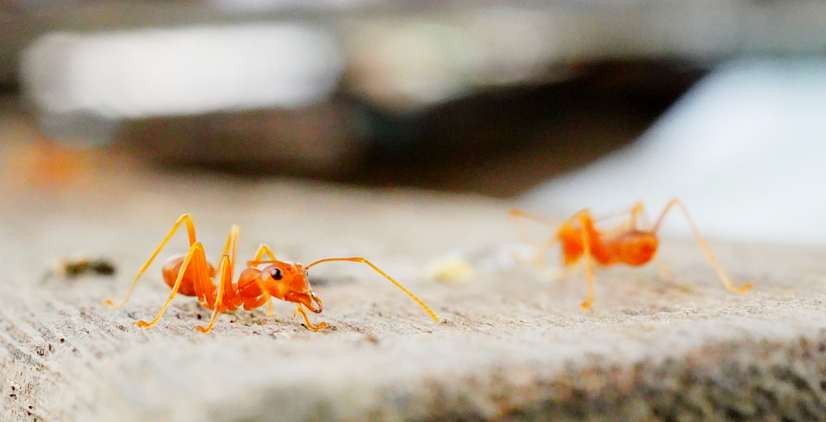When encountering ants, one might wonder, do ants bite? Ants are fascinating creatures that exhibit a wide range of behaviors, and biting is indeed one of them. While not all species of ants are biters, some have the ability to deliver painful bites or stings when they feel threatened or disturbed. Understanding whether ants bite and the potential effects of their bites can help us better navigate our interactions with these tiny yet intriguing insects. In this article, we will delve into the world of ant bites, exploring the reasons behind their biting behavior, the impact on humans and pets, preventive measures, and remedies for bites. Let’s unravel the truth about ants and their biting tendencies.

Basics Of Ant Bites
Ant bites can be a common annoyance, especially when dealing with ant infestations or encountering ants in outdoor settings. Understanding the basics of ant bites can help shed light on why they occur and how to manage them effectively.
Do Ants Bite Or Sting?
Different ant species exhibit distinct defensive mechanisms. For instance, fire ants are notorious for their painful stings, which they use as a means of defense. On the other hand, species like carpenter ants primarily rely on their strong mandibles to bite when feeling threatened or disturbed. It is important to recognize that not all ant species bite or sting humans, and the severity of the bites or stings can vary depending on the specific ant species involved.
Why Do Ants Bite?
Ants bite as a form of defense or aggression when they feel threatened or their colony is disturbed. When humans inadvertently come into contact with ants or their nests, the ants may perceive it as a threat and respond by biting. Additionally, some ants, such as carpenter ants, may bite when they feel their nesting sites are being disturbed.
What Is The Science Behind Ant Bites?
he skin. The purpose of ant bites is to subdue or immobilize potential threats. When ants bite, they inject a small amount of formic acid, venom, or other irritants into the wound. This can cause localized pain, redness, swelling, and itching.
The severity of ant bites can vary depending on factors such as the species of ant, individual sensitivity to ant venom, and the number of bites received. Some ant bites may be relatively mild, causing temporary discomfort and irritation, while others, such as those from fire ants or bullet ants, can be more painful and result in more severe reactions.
It is important to note that some individuals may experience allergic reactions to ant bites, which can manifest as more severe symptoms like difficulty breathing, hives, or swelling beyond the bite site. If you suspect an allergic reaction or experience severe symptoms, seek medical attention immediately.
Identifying Ant Species And Their Bites
Ants are a diverse group of insects, and their biting behavior can vary across different species. Let’s explore the key aspects of identifying ant species and understanding their bites.
What Types Of Ants Do Not Bite?
Certain ant species have relatively less aggressive behaviors and are less likely to bite humans. For example, sugar ants (also known as odorous house ants) are not typically aggressive and rarely bite. Similarly, pavement ants and ghost ants are less likely to bite unless directly provoked.
Which Species Of Ants Have The Most Painful Bites?
Among the biting ant species, the bullet ant (Paraponera clavata) is infamous for having one of the most painful bites in the insect world. Their bites have been described as similar to being shot, hence their name. The bite of a bullet ant is extremely painful and can cause intense throbbing and discomfort. Other examples of ants that bite include:
Warrior Wasp
The warrior wasp, although not an ant but a wasp species, deserves mention for its exceptionally painful sting. Found in Central and South America, this wasp delivers a sting that is described as searing and debilitating. The pain can be long-lasting, with effects lasting several hours. The warrior wasp’s sting is known to cause intense burning, swelling, and localized pain.
Bulldog Ant
Native to Australia, the bulldog ant is another species recognized for its painful bite. There are various species of bulldog ants, and their bites can cause severe pain, often described as sharp and excruciating. Some individuals may also experience allergic reactions to bulldog ant bites, resulting in additional complications.
Jack Jumper Ant
Found in Australia, the jack jumper ant delivers painful bites that can cause significant discomfort and allergic reactions. Their bites have been known to induce anaphylactic shock in susceptible individuals, making them a serious concern for those allergic to ant venom.
What Kind Of Ants Bite In North America?
In North America, several ant species are known to bite humans. This includes fire ants, carpenter ants, harvester ants, and various species of stinging ants such as the velvet ants (which are actually wasps). It is important to note that the severity of bites can vary among these species.
How Can I Identify An Ant Bite?
Ant bites can cause localized pain, redness, swelling, and itching at the site of the bite. The appearance of the bite may vary depending on the individual’s reaction and the specific ant species involved. In some cases, small blisters may develop. It is important to note that individual sensitivities to ant venom can also influence the severity of the bite reaction.
What Is The Difference Between A Fire Ant Bite And A Regular Ant Bite?
Fire ant bites are typically more painful and result in a characteristic pattern. Fire ants bite to gain traction and then inject venom through their stingers, which can cause a burning sensation. Their bites often result in raised, red welts that can develop into blisters. In contrast, regular ant bites may cause localized discomfort, but they are generally less painful and do not typically lead to blister formation.
Understanding The Impact Of Ant Bites On Humans
Ant bites can vary in their impact on humans, depending on factors such as the species of ant, individual sensitivity, and the number of bites received. Let’s delve into the details of how ant bites can affect humans.
What Happens When An Ant Bites You?
Ants possess specialized mouthparts, including mandibles and stingers, which they use to bite and inject venom, respectively. The exact mechanisms and components of ant venom can vary among different ant species. Ant venom is a complex mixture of various chemicals, including proteins, peptides, enzymes, alkaloids, and other bioactive compounds. These components work together to serve different purposes for the ants, such as defense, predation, or communication.
When an ant bites, its mandibles grip the skin, and depending on the species, it may use its mandibles to inject venom as well. The venom delivered through the bite or stinger contains a combination of compounds that can cause the observed effects on humans. The specific composition of the venom can determine the intensity of the bite, the resulting pain, and the subsequent reaction.
The bite site may exhibit immediate reactions such as redness, swelling, and localized inflammation. Some people may also experience itching or a burning sensation at the bite site. In certain cases, particularly with species like fire ants, multiple ants may attack simultaneously, resulting in a cluster of bites in the same area.
Are Ant Bites Dangerous To Humans?
In general, most ant bites are not considered dangerous to humans. However, some species, such as fire ants and certain aggressive ants, can cause more significant discomfort and may pose a greater risk, particularly to individuals with allergies or sensitivities to ant venom.
How Long Does It Take For An Ant Bite To Heal?
The healing time for an ant bite depends on various factors, including the individual’s healing process and the severity of the bite. In most cases, ant bites heal within a few days to a couple of weeks. However, if complications arise or if the bite becomes infected, the healing time may be longer.
Can An Ant Bite Cause An Allergic Reaction?
Yes, ant bites can trigger allergic reactions in certain individuals. Allergies to ant venom are more commonly associated with species like fire ants, which are known for their aggressive behavior and venomous stings. When an allergic individual is bitten by an ant, their immune system overreacts to the venom, leading to an allergic response.
Symptoms of an allergic reaction to ant bites can vary in severity. Mild reactions may include itching, redness, and localized swelling around the bite site. In more severe cases, individuals may experience hives (urticaria), widespread swelling beyond the bite site (angioedema), or difficulty breathing. Anaphylaxis, a severe and potentially life-threatening allergic reaction, can also occur but is rare.
If someone has a known allergy to ant venom or has previously experienced an allergic reaction, they should carry an epinephrine auto-injector (commonly known as an EpiPen) prescribed by a healthcare professional. If they are bitten and start to exhibit signs of an allergic reaction, immediate administration of the epinephrine auto-injector followed by seeking emergency medical assistance is crucial.
Can Ant Bites Lead To Infection?
Although rare, ant bites can potentially lead to infections if bacteria enter the skin through the bite wound. It is important to keep the bite area clean and watch for signs of infection such as increased pain, redness, swelling, warmth, or the development of pus. If signs of infection occur, medical attention should be sought.
Are There Any Long-Term Effects From An Ant Bite?
In general, ant bites do not result in long-term effects. However, in rare cases, individuals may experience lingering hypersensitivity or prolonged redness and itching at the bite site, known as a delayed hypersensitivity reaction.
Can Ant Bites Leave Scars?
In most cases, ant bites do not leave scars. However, excessive scratching of the bite site or secondary infection can potentially lead to scarring. It is important to avoid scratching the bite and to keep the area clean to minimize the risk of complications.
To minimize the risk of scarring from ant bites, it is essential to follow proper wound care practices. Clean the bite site with mild soap and water, and avoid scratching or picking at the area. Applying an over-the-counter antibiotic ointment and covering the bite with a sterile bandage can help protect the wound and promote healing. If signs of infection, such as increased redness, swelling, or discharge, develop, it is important to seek medical attention promptly.
In cases where scarring does occur, various treatment options are available, including topical treatments, laser therapy, corticosteroid injections, or surgical intervention. Consulting with a dermatologist or a healthcare professional experienced in scar management can provide guidance on the most appropriate treatment approach based on individual circumstances.
What Are Some Diseases Or Conditions Associated With Ant Bites?
While ant bites are generally not associated with the transmission of diseases, there are a few exceptions. Some ant species can carry and transmit pathogens that may cause infections or trigger allergic reactions in humans. It’s important to note that these instances are relatively rare, and the risk of contracting a disease from an ant bite is generally low. However, it’s still crucial to be aware of potential diseases or conditions that can be associated with ant bites.
One example is the Tunga penetrans, commonly known as the chigoe or sand flea. These small parasitic fleas burrow into the skin and can cause severe itching, inflammation, and infection. Although not classified as ants, their bites can often be mistaken for ant bites due to their similar appearance and symptoms.
Another example is the Siafu ant, also known as driver ants or safari ants. These aggressive ants are found in Africa and have a painful bite. While their bite itself may not transmit diseases, the swarms of siafu ants can sometimes disrupt ecosystems and lead to the spread of other parasites or pathogens.
Can You Be Immune To Ant Bites?
Individuals can develop a certain level of tolerance or immunity to ant bites over time. This is more commonly observed in individuals who are frequently exposed to ant bites or stings, such as those who work outdoors or in environments where ants are prevalent. However, it is important to note that individuals with allergies to ant venom can have severe reactions regardless of exposure history.
Remedies And Treatment For Ant Bites
Ant bites can be uncomfortable and cause itching, redness, and swelling. While most ant bites do not require medical intervention, there are several remedies and treatments available to alleviate symptoms and promote healing.
How Can I Treat An Ant Bite At Home?
When treating an ant bite at home, there are several steps you can take to alleviate discomfort and promote healing. Start by washing the affected area with mild soap and water to cleanse the bite site and reduce the risk of infection. Applying a cold compress or ice pack wrapped in a cloth can help reduce swelling, numb the area, and provide relief from itching. Over-the-counter antihistamines like diphenhydramine (Benadryl) can be taken to relieve itching and minimize allergic reactions. Topical hydrocortisone creams or ointments can be applied to reduce inflammation and itching. Remember to keep the bite area clean and dry, and avoid scratching to prevent further irritation or infection.
How Do I Soothe The Itching From An Ant Bite?
To soothe the itching from an ant bite, there are several remedies you can try. One effective option is to apply calamine lotion to the bite area, as it can provide relief and a cooling sensation. Another natural remedy is aloe vera gel, which can help alleviate itching and calm the skin. Applying a small amount of aloe vera gel directly to the bite can offer soothing effects. Additionally, taking a bath with colloidal oatmeal can be beneficial for relieving itching caused by multiple ant bites or larger areas of irritated skin. Follow the instructions on the oatmeal bath product to properly use it and experience its soothing properties. These remedies can help provide relief from the itching sensation commonly associated with ant bites.
Are There Any Natural Remedies For Ant Bites?
When it comes to natural remedies for ant bites, there are a few options worth considering. One such remedy is witch hazel, which can be applied to the bite area using a cotton ball or pad. Witch hazel has anti-inflammatory properties that help reduce redness and swelling. Another natural option is tea tree oil, which should be diluted with a carrier oil, such as coconut oil, before being sparingly applied to the bite. Tea tree oil has antimicrobial and anti-inflammatory properties that can aid in soothing the bite. Additionally, crushing fresh basil or peppermint leaves and applying them directly to the bite can provide relief. These herbs have cooling and anti-inflammatory properties that may help alleviate discomfort. It’s important to keep in mind that individual reactions to natural remedies can vary, and it’s advisable to discontinue use if any adverse reactions occur. If symptoms persist or worsen, seeking medical advice is recommended.
Effects Of Ant Bites On Pets
Ant bites can also affect our furry friends, such as dogs and cats. While the severity of the effects may vary depending on the species of ant and the individual pet’s reaction, it’s important to be aware of the potential harm that ant bites can cause to pets.
Are Ant Bites Harmful To Pets Like Dogs Or Cats?
Yes, ant bites can be harmful to pets. Some ants have venomous bites that can cause allergic reactions, pain, swelling, and irritation in dogs and cats. Certain species, such as fire ants, can deliver painful stings that may lead to more severe reactions. It’s essential to understand that pets can have varying sensitivities to ant venom, so their reactions may differ.
Pets that are bitten by ants may exhibit signs of distress, such as intense scratching, licking, or biting at the affected area. They may also show signs of pain, swelling, redness, or even develop hives or blisters. In severe cases or if the pet has been bitten multiple times, systemic reactions such as difficulty breathing, weakness, or collapse can occur, requiring immediate veterinary attention.
It’s important to note that not all ant species pose the same level of threat to pets. Some ants, like the common black garden ant, may bite but generally do not cause severe reactions. However, it’s still crucial to monitor pets for any signs of discomfort or allergic reactions after an ant bite.
If your pet has been bitten by ants and displays any concerning symptoms, it’s recommended to seek veterinary care. The veterinarian can assess the severity of the bite, provide appropriate treatment, and alleviate your pet’s discomfort. They may administer antihistamines, prescribe pain relievers or topical treatments, or recommend other interventions based on the specific circumstances.
Preventive Measures And Safety Tips
Preventing ant bites and minimizing the chances of encountering ants can be achieved through various measures and safety precautions. By following these tips, you can reduce the risk of ant bites and ensure a safer environment.
How Can I Prevent Ants From Biting Me?
Preventing ant bites and ensuring your safety can be achieved through several preventive measures. To avoid ant bites, it is important to maintain cleanliness by keeping your surroundings clean and free from food debris. Sealing entry points, such as cracks and gaps, can prevent ants from entering your home. Properly storing food in tightly sealed containers can discourage ants from being attracted to your kitchen. Additionally, regular cleaning of outdoor areas, ant-proofing your pet’s feeding area, and using ant deterrents like traps or barriers can help prevent ants from entering your living spaces. By following these preventive measures consistently, you can minimize the chances of encountering ants and reduce the risk of ant bites.
Is There A Particular Time Of Year When Ants Are More Likely To Bite?
Ant activity and the likelihood of ant bites can vary depending on the species and environmental factors. However, generally, ants tend to be more active during the warmer months, particularly in spring and summer. During these seasons, ants are actively foraging for food and establishing new colonies, which may increase the chances of encountering them.
It’s important to note that certain ant species, like fire ants, can be more aggressive and prone to biting. Fire ants are known for their painful stings and are commonly found in warm regions. They may become more active during the hotter months, presenting a higher risk of bites.
However, it’s essential to remember that ants can be present throughout the year, and their activity levels can also be influenced by factors such as food availability and environmental conditions.
Conclusion
Ants are known to bite as a means of defense or when they feel threatened. While not all species of ants bite, some have the ability to inflict painful bites or stings. It is important to be aware of the potential for ant bites, especially if you are in an area known for aggressive ant species like fire ants. Understanding the behavior of different ant species and taking preventive measures can help minimize the risk of ant bites. If bitten, prompt and appropriate treatment, along with proper hygiene, can aid in the healing process and prevent complications. Overall, being knowledgeable about ant behavior and taking necessary precautions can help ensure a safer and more comfortable environment.




